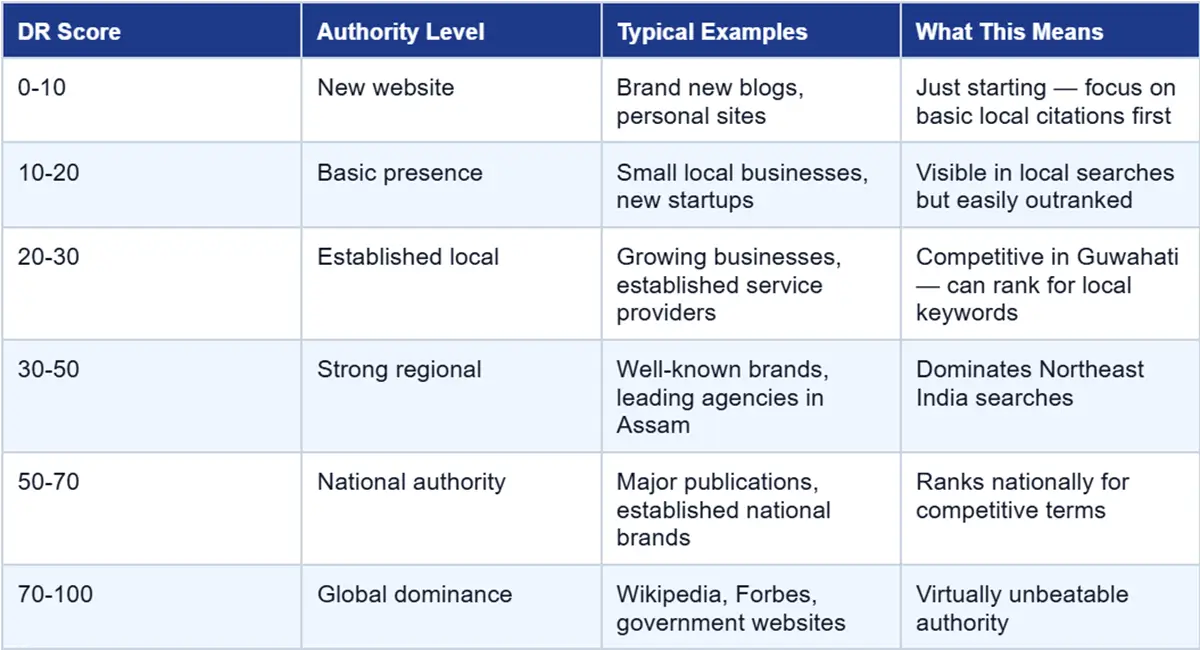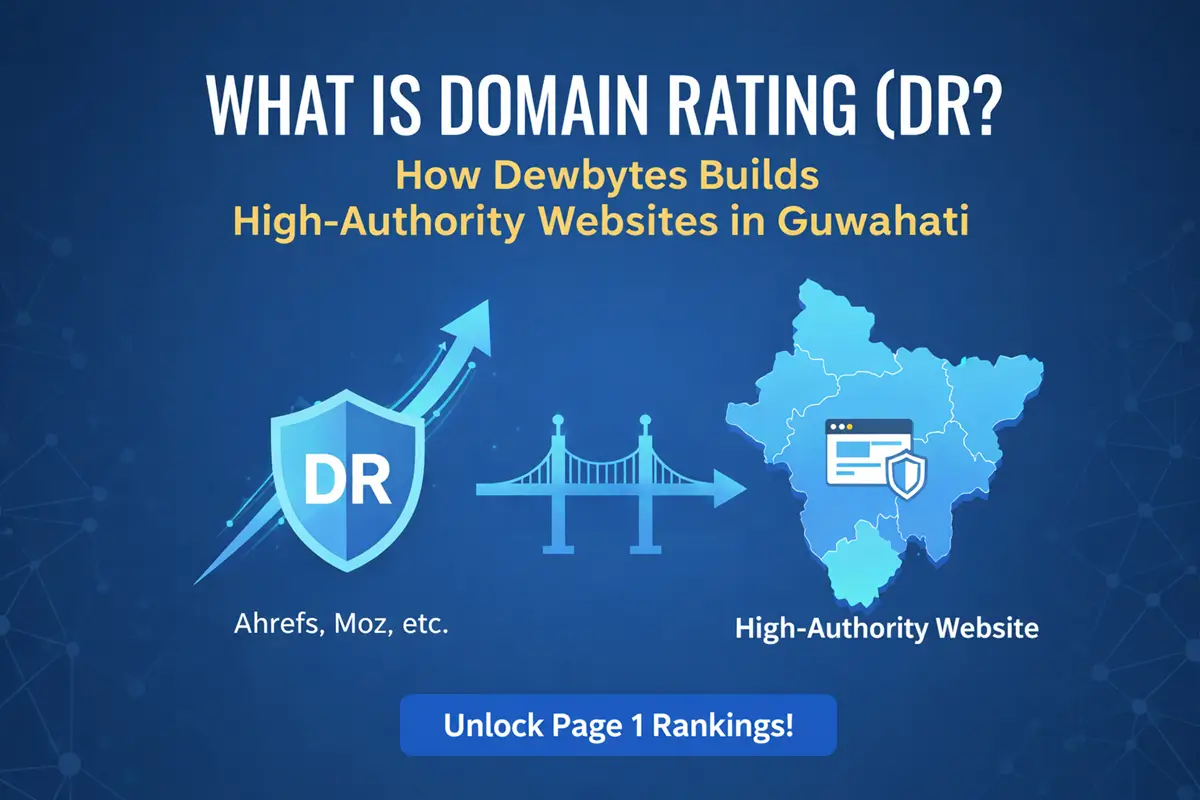Domain Rating (DR) is a metric that measures the strength of a website’s backlink profile on a scale from 0 to 100. Developed by Ahrefs, MOZ etc. DR predicts how well a website will rank in search engines based on the quality and quantity of backlinks pointing to it.
In simple terms: The higher your DR, the more Google trusts your website — and the easier it becomes to rank on page 1 for competitive keywords.
While DR isn’t a direct Google ranking factor, it’s one of the strongest indicators of a site’s overall SEO health and competitive strength. For businesses in Guwahati and Assam, understanding and improving your Domain Rating is critical to outranking local and regional competitors.
Check Page Contents
ToggleWhy Domain Rating Matters for every Businesses.
If you run a business in Guwahati, Assam, or Northeast India, your Domain Rating directly impacts your ability to compete in Google search results.
Here’s what DR controls:
✓ Search Visibility — Websites with higher DR consistently rank higher for competitive keywords
✓ Brand Credibility — A DR above 30 signals trust and authority to both Google and potential customers
✓ Competitive Advantage — If your competitor has DR 40 and you have DR 15, they’ll almost always outrank you
✓ Organic Traffic Growth — Higher DR leads to better rankings, which drives more free traffic from Google
✓ Local Market Dominance — For Guwahati-based businesses, even a DR of 25–35 can dominate local search results

Industry insight from our experience: Most small and medium businesses in Guwahati operate with a Domain Rating between 10–20. Digital marketing agencies typically sit between 15–30. By strategically building a quality backlink profile, local businesses can reach DR 30–45 within 6–12 months, giving them a decisive ranking advantage over 90% of their local competition.
Understanding the Domain Rating Scale: What Your Score Really Means

For a Guwahati-based business: A DR of 25–35 is competitive enough to dominate local search results for service-based keywords like “digital marketing agency Guwahati,” “website design company Assam,” or “best restaurants in Guwahati.”
Reaching DR 40+ puts you ahead of almost every competitor in Northeast India, including established players.
How Domain Rating is Actually Calculated
Domain Rating isn’t arbitrary — Ahrefs uses a sophisticated algorithm that evaluates:
1. Number of Unique Referring Domains
The total count of different websites linking to you. 100 links from 10 websites count less than 50 links from 50 unique websites. Google values diversity.
2. Quality of Linking Domains
A single backlink from The Times of India (DR 91) or Economic Times (DR 90) can add 5–10 DR points. Meanwhile, 100 links from low-quality directories might add only 1–2 points.
What makes a high-quality backlink:
- High DR of the linking site (ideally 40+)
- Relevant to your industry or region
- Editorial in nature (earned, not paid)
- From a trusted, established website
3. Dofollow vs Nofollow Links
Only “dofollow” links pass DR authority. “Nofollow” links still have SEO value (traffic, brand awareness) but don’t directly boost your DR score.
4. Link Growth Velocity
Steady, natural link growth over time is valued more than sudden spikes. Earning 5 backlinks per month consistently is better than 50 links in one week, then nothing for months.
5. Toxic Link Filtering
Ahrefs automatically filters out spam links and link farms. If your backlink profile includes toxic links (paid link schemes, spam directories), Ahrefs may discount them, preventing artificial DR inflation.
Important note: DR is logarithmic, not linear. Moving from DR 10 → 20 requires roughly 10 quality backlinks. Moving from DR 50 → 60 might require 100+ high-authority backlinks. Each level gets exponentially harder.

How Dewbytes Increases Domain Rating for Guwahati Businesses: Our Proven Process
At Dewbytes, we’ve been building strategic backlink profiles for businesses across Guwahati and Assam since 2021. Here’s our systematic 6-step approach to increasing Domain Rating while driving real business results:
Step 1: Comprehensive Backlink Audit & Competitive Analysis
Before building new links, we analyze your current situation:
- Your existing backlink profile (quality, diversity, anchor text)
- Toxic or spammy backlinks that could be hurting your rankings
- Your current DR compared to direct competitors
- Top 5 competitors’ backlink sources
- Link gap analysis (sites linking to competitors but not to you)
Deliverable: A detailed audit report showing exactly where you stand and which opportunities will have the highest impact.
Step 2: Strategic Local Citations & Business Listings
For Guwahati and Assam-based businesses, local citations are the foundation of DR growth.
High-priority directories we target:
- Justdial (DR 76) — Essential for local visibility
- IndiaMART (DR 80) — B2B credibility
- Sulekha (DR 65) — Service-based businesses
- TradeIndia (DR 67) — Manufacturing and wholesale
- Clutch.co (DR 93) — For agencies and B2B companies
- Goodfirms (DR 63) — Digital marketing agencies
Impact: This step alone typically increases DR by 5–10 points for local businesses starting below DR 20. It’s the fastest, most reliable foundation for long-term DR growth.
Step 3: Content-Driven Link Acquisition
We create high-quality, original content and publish it on relevant, high-authority websites with natural backlinks to your site.
Our outreach targets:
Local Assam media: Assam Tribune, Pratidin Time, Northeast Now
National industry blogs and publications
Niche-relevant websites and forums
Step 4: Broken Link Building & Digital PR
This is one of the most effective (and underutilized) link-building strategies.
We find broken links on high-DR websites and offer your content as a replacement — solving a problem for the website owner.
Step 5: Strategic Partnership & Co-Marketing Links
We help you build mutually beneficial relationships that result in natural backlinks:
- Local business associations and chambers
- Industry events and sponsorships
- Co-marketing campaigns with complementary businesses
- University partnerships and educational collaborations
Step 6: Ongoing Monitoring, Reporting & Strategy Refinement
What we track monthly: Current DR score, new backlinks earned, referring domains, anchor text distribution, competitor DR movements, and lost or broken backlinks (we reclaim these).
Our commitment: Clients working with Dewbytes see an average DR increase of 10–20 points within the first 6 months of our link-building program.
Real Client Case Study: Guwahati E-Commerce Store
How We Increased Domain Rating from 12 to 38 in 8 Months
Client: An online retailer based in Guwahati specializing in authentic Assamese handloom products (mekhela chadors, gamosas, traditional wear).

What We Did:
Month 1-2: Foundation & Cleanup
Conducted full backlink audit, disavowed 14 toxic links, built 18 local citations, optimized Google Business Profile.
Result: DR increased from 12 → 19
Month 3-5: Content & PR Outreach
Published 6 guest posts on Assam lifestyle and e-commerce blogs, earned 2 editorial backlinks from Northeast media
Result: DR increased from 19 → 31
Month 6-7: Strategic Partnerships
Partnered with Assam Tourism, listed on Government of Assam portal, collaborated with fashion bloggers
Result: DR increased from 31 → 36
Month 8: Sustained Growth
Continued monthly guest posting, earned backlinks from handloom forums
Result: DR reached 38Key Takeaway: Strategic, consistent link-building increased this client’s DR by 26 points in 8 months. The result wasn’t just a higher score — it was a 3.4x increase in revenue.
How Long Does It Actually Take to Increase Domain Rating?

For most Guwahati-based businesses: Reaching DR 30–40 is achievable within 6–8 months with consistent monthly effort. This level of authority is more than sufficient to dominate local search results across Assam and Northeast India.
Frequently Asked Questions About Domain Rating
1. What is a good domain rating for a small business?
A DR of 20–35 is competitive for most local businesses in Guwahati, Assam and local businesses in other parts of India. Reaching DR 30+ gives you a strong advantage over most local competitors, who typically sit between DR 10–25. Established regional businesses usually have DR 25–40, while national brands operate at DR 50+.
2. Is Domain Rating the same as Domain Authority?
No. Domain Rating (DR) is created by Ahrefs on a 0-100 scale, while Domain Authority (DA) is created by Moz on a 1-100 scale. Both measure backlink profile strength, but DR focuses more on link quality while DA weighs quantity more heavily.
3. Can I increase my Domain Rating quickly?
No safe shortcuts exist. Domain Rating growth requires earning high-quality backlinks over time. Expect 3-4 months to move from DR 10 to DR 25, 6-8 months to move from DR 20 to DR 35, and 12+ months to move from DR 30 to DR 50. Any service promising DR 50 in 30 days is using black-hat tactics that will result in Google penalties.
4. Does Domain Rating directly affect Google rankings?
Not directly — Google doesn’t use Ahrefs’ DR metric in its ranking algorithm. However, DR is a strong proxy for what does affect rankings: backlink quantity, backlink quality, and domain authority signals. Higher DR almost always correlates with better Google rankings.
5. What’s more important: Domain Rating or high-quality website content?
Both are essential and work together. Great content attracts backlinks which increases DR. High DR helps you rank higher which drives traffic to your content. You cannot succeed with just one.
6. How do I check my competitor’s Domain Rating?
You can check competitor DR for free using Ahrefs’ free backlink checker at ahrefs.com/backlink-checker. Enter your competitor’s domain to view their DR score and top backlinks.
7. Should I focus on increasing DR or growing organic traffic?
Focus on organic traffic as your primary goal. Domain Rating is a useful metric to track progress, but it’s not the end goal — business growth is. Use DR growth as one indicator that your link-building is working.
Tools to Check Your Domain Rating
Free Tools:
- Ahrefs Backlink Checker (limited free version) — Best for DR tracking
- Ubersuggest — Free checks for DR and basic backlink analysis
- Moz Link Explorer — Shows Domain Authority (DA), a similar metric
Paid Tools (for serious SEO):
- Ahrefs ($129/month) — Industry-standard DR tracking
- Semrush ($139/month) — Authority Score (similar to DR)
- Moz Pro ($99/month) — Tracks Domain Authority (DA)
At Dewbytes: We use Ahrefs and Semrush to track Domain Rating, analyze competitor backlink profiles, and monitor our clients’ link-building progress. Clients receive detailed monthly reports.
How Dewbytes Can Help You Build Domain Authority in Guwahati
Whether you’re a startup in Guwahati or an established business in Assam, increasing your Domain Rating requires expertise, time, and consistent effort. At Dewbytes, we handle the entire backlink strategy for you:
✓ Comprehensive Backlink Audit – Identify toxic links and growth opportunities
✓ Strategic Link Building Plan – Custom roadmap based on your industry and goals
✓ Local Citations & Directory Submissions – Build foundational DR through Assam-focused listings
✓ Guest Post Outreach – Earn high-quality editorial backlinks
✓ Digital PR & Media Relations – Secure mentions from Assam news outlets
✓ Ongoing Monitoring & Reporting – Track DR growth monthly
✓ White-Hat, Penalty-Proof Methods – All strategies comply with Google’s guidelines
Our track record: Dewbytes clients see an average Domain Rating increase of 10–20 points within 6 months – enough to outrank most competitors in Guwahati and dominate search results across Northeast India.
Ready to Increase Your Website’s Domain Rating?
If your business is struggling to rank on Google, low Domain Rating might be the missing piece. Let Dewbytes build a strategic, ethical backlink profile that increases your authority, improves your rankings, and drives more customers to your business.
Get a Free SEO Audit & Backlink Analysis
We’ll analyze your current Domain Rating, compare it to your top competitors in Guwahati, and show you exactly what’s holding you back.
You’ll receive:
- Your current DR score and backlink profile analysis
- Competitor DR comparison (see where you stand)
- List of quick-win link opportunities
- Custom 90-day DR growth plan
- Estimated timeline to outrank your competitors
No cost. No obligation. Just honest insights from Guwahati’s most trusted SEO experts.
Contact Dewbytes:
📞 Phone: +91 7002763122
📧 Email: azrarn786@gmail.com / dewbytestechnology@gmail.com
🌐 Website: dewbytes.com
📍 Office: Guwahati, Assam, India
Serving Guwahati, Assam & Northeast India since 2021
Trusted by 100+ businesses across Assam for SEO, website design, and digital marketing
Related Services:
- SEO Services in Guwahati — Complete on-page and off-page SEO optimization
- Website Design Company Guwahati — Fast, mobile-responsive websites
- Google Ads Management — PPC campaigns that drive qualified leads
- Social Media Marketing Assam — Build brand awareness that attracts backlinks
- Content Writing Services — High-quality content that earns editorial backlinks

I’m Azahar Hussain, founder of Dewbytes and a digital marketing professional based in Guwahati, Assam. With an MCA (Masters in Computer Application) degree and over 12 years of hands-on experience in IT, networking, web development, and SEO, I’ve spent more than a decade helping businesses across India and internationally build stronger online presence through practical, results-driven strategies.
My work centers around understanding what actually moves the needle for businesses—whether that’s improving Google rankings, developing high-performing websites, or creating sustainable lead generation systems. I don’t believe in shortcuts or temporary fixes. Instead, I focus on data-backed approaches that deliver consistent, long-term growth.
At Dewbytes, I work with clients ranging from small local businesses to established brands across different industries and geographies. As both a WordPress developer and SEO specialist, I bring a unique advantage: I understand how to build websites that not only look good but are technically optimized for search engines from the ground up. My services include custom website development, WordPress solutions, SEO strategies, website optimization, content planning, and targeted digital campaigns.
My approach is simple: listen to what the business needs, study the audience behavior, and build campaigns that align with real business goals. Whether I’m developing a new website or optimizing an existing one, I ensure every technical element supports better visibility and user experience.
While I’m based in Guwahati and have extensive experience working with businesses across the North-Eastern states, my expertise extends to serving clients throughout India and beyond. I understand both regional market dynamics and global digital trends, which helps me create strategies that work in diverse contexts.
My core expertise includes WordPress development, website design and optimization, search engine optimization, local and international SEO, digital brand development, and results-driven advertising campaigns.
Need help with your digital strategy?
If you’re looking for guidance on website development, SEO, or building a stronger digital presence, I’m available for consultations and project-based support. Let’s discuss how we can grow your business online.





